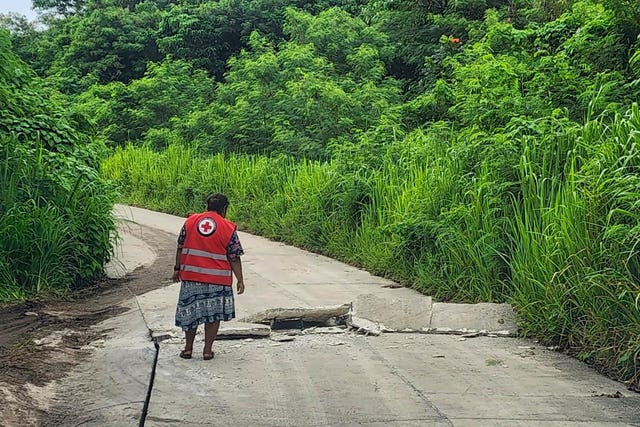The search has been expandedfor those killed or trapped alive by an earthquake in the Pacific island nation of Vanuatu
Rescue workers arriving from abroad fanned out through the capital Port Vila on Thursday, encountering flattened buildings that had not yet been searched.
Three days after the violent magnitude 7.3 quake struck just offshore from Vanuatu’s most populous island, uncertainty persisted about the number of people dead and wounded.
Damage was concentrated in Port Vila’s downtown area and the official figure of 10 confirmed deaths and more than 200 people injured was a day old and likely to rise, officials said.
Nearly 1,000 people were displaced, according to United Nations figures. Aid workers estimated about 20,000 people were likely without water.
The biggest threat was the spread of illness from people drinking contaminated water, said Brecht Mommen, a Unicef water, sanitation and hygiene specialist based in Vanuatu.
“It’s a rush against time to get water trucks organised for those areas so that we prevent a second disaster, which is a diarrhea outbreak,” he said.
It was still unclear where broken pipes were located in the immense network servicing Port Vila and it was unknown how long it would take to find and fix them all, he added.
Relief efforts were hampered by blocked roads, traffic jams and patchy communications.
Rain forecast in the next few days threatens to worsen landslides prompted by the quake which included a major slip that has blocked Vanuatu’s sea port.

It prompted quiet hope for a return to normal among residents accustomed to life in one of the world’s most natural disaster-prone countries.
The country is also among the world’s most imperilled by climate change. Earlier this month Vanuatu led a group of small island nations in a landmark case on the matter in the top United Nations court.
The country’s envoys argued that as rising seas threaten the existence of Vanuatu and other nations, major polluting countries should be ordered to take more responsibility for curbing their emissions.
Lush tropical forests and azure seas make the country a popular destination for holidaymakers from Australia and New Zealand, and tourism accounts for about 40% of the economy. The other major contributor is agriculture, with products exported or sold to tourist resorts.
Disasters of recent years have frustrated its growth. Visitor numbers dwindled during the coronavirus pandemic and had barely started to recover before three major cyclones in 2023 dealt another blow. In May, the country’s national airline collapsed.
Vanuatu is currently led by a caretaker government after President Nikenike Vurobaravu dissolved Parliament in November as Prime Minister Charlot Salwai faced a no-confidence vote.
Mr Salwai, now the caretaker leader, is Vanuatu’s fourth Prime Minister in four years, with his predecessor toppled in a confidence vote in 2023 after a month in office. An election is due in January.






